IC面经找不到怎么办?这份超干货Kira面试技巧必须拥有!
IC面经找不到怎么办?这份超干货Kira面试技巧必须拥有!

申请季又到啦,想必也有很多小伙伴已经收到了来自院校的面试通知(′▽`〃)
虽然小鸥在往年已经给大家介绍过Kira面试的机制及准备Tips,但今年还是想在同学们面试之际,给大家额外补充一些往年没有提及过的Tips,希望能够助力大家顺利通过面试,拿到offer!

InVisor帝国理工商学院Kira面试辅导又上线啦,特邀IC招生官助力通关,感兴趣的同学请戳小助手联系方式详询!
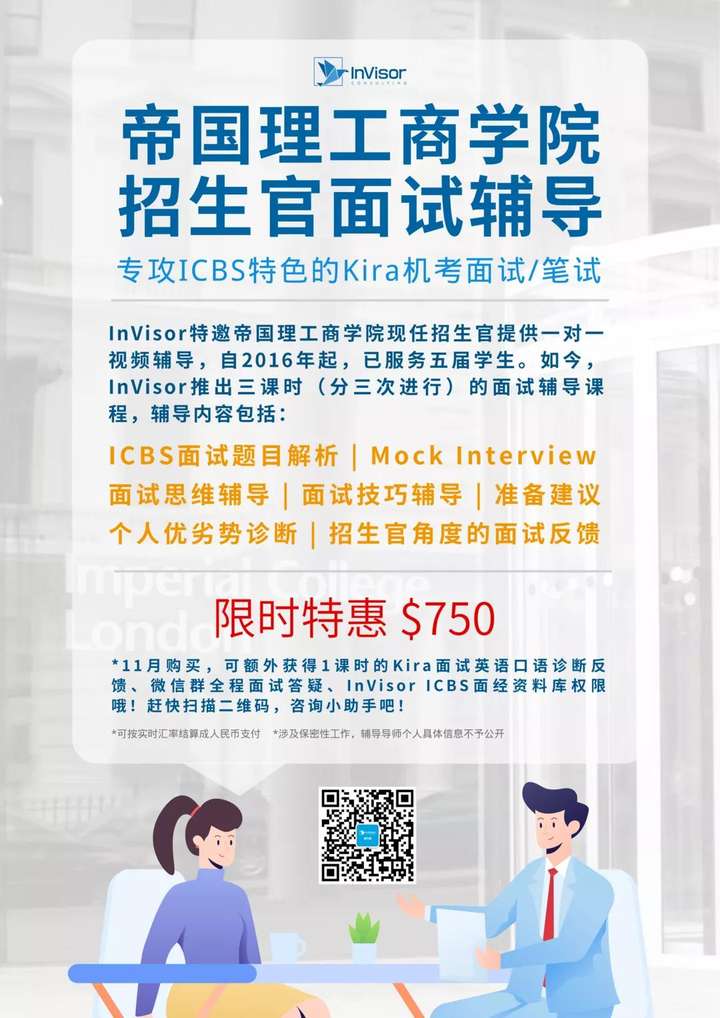
1. 什么是 "Kira Talent",以及它是如何用于招生的?
Kira Talent是一种用于审查候选人个人特质的在线面试平台,常见于国外院校用来面试申请的学生。该平台的面试形式主要以文字和视频为主,由申请者自主选择合适时间、地点完成即可。
在Kira Talent面试中,不会有真人和你互动,系统会以视频或者文本的形式显示问题,申请者只需要基于ta给定的形式和问题进行回答即可。
那么,院方额外增加面试环节的意图是什么呢?
因为除了申请材料之外,招生官还希望看到你的领导潜力、口头和书面沟通能力、对关键概念的理解、驱动力、动机以及专业精神。申请材料是可以通过专业导师的协助进行润色的,而Kira面试针对的只有申请者一个人,不允许有他人从旁协助。
简单来说,Kira面试能够反映出申请者最真实的一面,ta能够让招生官看到“在现实情境下,申请者能够显现出的特质”,这些特质正是招生用以评估申请者是否符合他们项目需求的重要维度之一。
Kira面试的问题是由系统随机分配的,准备和回答的时间因学校而异。视频问题的准备时间在30秒到几分钟不等;文字问题没有准备时间,申请者需要根据系统显示的问题立即进行作答。同样,回答时间也没有固定的标准,有的低至30秒,有的长达数分钟。
面试结束后,Kira Talent内置的系统会先自动审查你的书面答复,如拼写和语法。每个申请人的回答都会收到基于拼写和语法的书面沟通分数,这个分数会与你的视频和文字回答一起发送给院校招生办,由院校招生官一起分析你的所有面试表现。
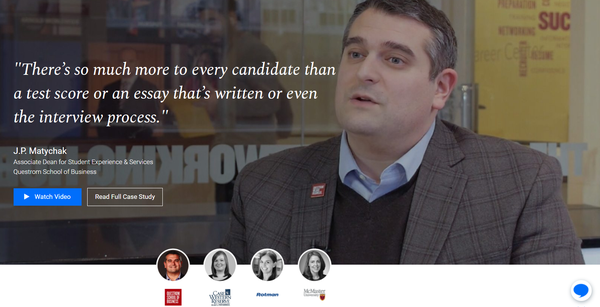
2. Kira Talent面试的基础知识和基本原理
面试流程
Kira面试的入口是因学校而异的,常见的有以下几种情况:
-
网申入口就有Kira面试的链接(比如:美国约翰斯·霍普金斯大学);
-
申请提交后,院方给符合标准的申请者发送Kira面试链接(比如:英国帝国理工商学院);
-
...
如果你没有收到来自学校/项目的Kira面试要求,一定要检查一下邮箱里的垃圾箱,有的邮箱筛选机制比较“鸡肋”,很有可能会把Kira面试邮件误放进垃圾箱里。同时,所有来自项目/学校和Kira Talent的邮件最好保留,直到面试结束并提交,而且还要确保你已经阅读完所有的邮件,因为有一些重要的信息和指示会包含在内。收到面试通知后,邮件上会有一个面试截止日期,你必须在这个日期之前完成并提交面试;如果没有在这个时间范围内完成,你就会被取消面试资格,不存在延期的机会。
技术要素
由于Kira Talent面试采用的是文本和视频的形式,所以需要在面试之前,一些基本的技术设备必须准备好。以下是部分要点:
-
面试可以在家里(或有稳定互联网连接的任何地方)进行;
-
可以使用笔记本电脑或台式电脑,不支持手机和平板电脑(包括iPad或Surface Pro);
-
需要下载KiraTalent软件,并在开始面试前确保它是最新版本;
-
确保你的电脑有“可使用”的网络摄像头、麦克风、扬声器和稳定的互联网连接;
-
一般不建议使用Wi-Fi连接进行在线面试,因为Wi-Fi相对而言没那么稳定,有可能会扰乱你的面试;
-
确保你的电脑启用了Flash,并且已经禁用了任何广告屏蔽程序、通知和防火墙。通知可能会分散你的注意力,使你失去思考,所以最好关闭;广告拦截器也最好不要使用,因为有些面试题目可能会需要弹出;
-
在接到你必须使用Kira平台进行面试的通知后,你会收到一个网站的URL,然后就可以用你的电子邮件ID进行注册。在此之后,你会看到一步步的指示,在正式面试之前,你是有机会在面试练习中测试你的电脑、相机、麦克风等设备的;
-
一般来说,Kira面试大约会持续30-60分钟,长度、问题数量、问题准备时间以及答案的反应时间因学校而异。通常来讲,会有5-10个问题,有的问题需要3-5分钟才能完成。
关于视频面试:
在视频问题中,系统会给你看一段预先录制好的视频,然后会给你30-60秒左右的时间进行准备,而后系统将对你的回答进行录制,回答的时间由面试你的大学决定。在整个面试过程中,不需要去考虑打开和关闭摄像机的问题,在准备时间结束后(并在你允许该系统访问你的摄像机的前提下),摄像机将自动开始录制。在录制开始前,屏幕顶部会有倒计时提醒你剩余准备的时间。
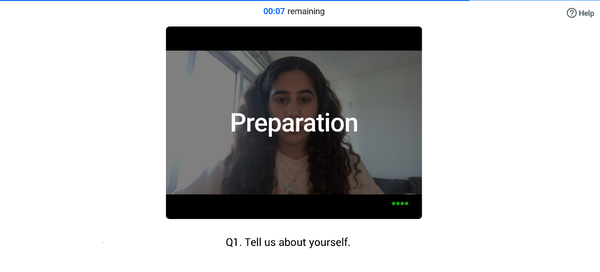
关于文本面试:
问题文本将显示在屏幕上,你需要针对该问题输入文本答复。与视频面试一样,分配给申请者的回答时间因学校而异,但需要注意的是,文本面试没有额外的准备时间去整理你的想法,你需要立即“动笔”组织和撰写你的答案。
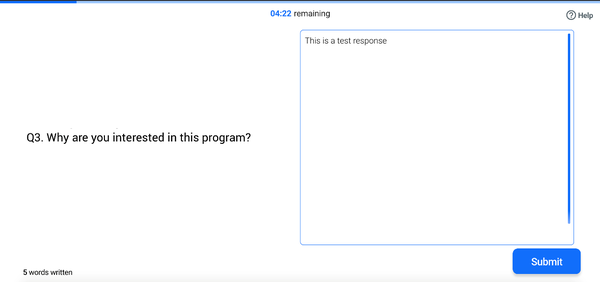
3. Kira面试需要准备的事项
在进行在线面试时,有一些“专业性”的细节是很容易被忽略的。在进行在线面试之前,有以下几点需要先自我检查一下:
① 个人着装
确保着装得体,最好穿得正式一些,基本要求和企业面试的着装差不多。尽量不要穿非常休闲的衣服参加面试,比如:睡衣裤。女生可以简单画个淡妆,男生保持干净、整洁即可,不要让自己看起来邋里邋遢。
② 面试地点
尽量选择纯色的背景墙,装潢相对干净、整洁的墙也可以。总之不要让你的背景看起来乱七八糟的。
③ 摄像机位置
相机最好可以捕捉到你的头部和肩膀。头顶最好不要被屏幕的顶部切断,最好可以露出肩膀及以上的部分。也别只露个头给招生官看,这样会显得你很像“大头娃娃”。
另外,最好让摄像机处于一个比较舒适的高度和角度,这样你就不需要通过仰视或俯视来面对摄像机。有必要的话,可以把你的笔记本电脑放在一些书上或一个支撑物上,让摄像机处于合适的位置。

④ 光线
你所坐的地方光线最好要充足,至少保证你的脸是被“照亮”的。如果可以的话,最好坐在自然光下,尽量正对光源;如果光源在你后面,你就会处于背光的状态,这样的话,你的面部特征和表情会比其他不太明显。
⑤ 身体姿势
尽量坐笔直,并正面镜头。在回答问题时,也要尽量看向镜头。有的同学出于紧张、胆怯,会经常在面试的时候低头看自己,这是非常不可取的。直视镜头是模仿远程采访中的眼神交流,而保持眼神交流对于呈现出一个自信的自我是非常关键的。此外,与招生官的眼神接触也会使你的回答更有吸引力,使这些答案在虚拟环境中感觉更自然,并向招生官表明你是作为一个成熟的专业人士在回答问题。
⑥ 声音
尽量减少噪音。无论你在哪里完成面试,都要尽可能地控制你周围的噪音。
下面是一些建议:
-
让周围的人知道你在进行面试,请他们保持安静;
-
关掉电视或有声音的设备,如果有人在另一个房间看/听,确保你的麦克风完全听不到声音;
-
把你家的狗狗、猫猫或任何可能发出声音的动物暂时放到其他地方;
-
关闭你周围的窗户和风扇;
-
如果你是住在繁忙的道路附近,尽量在繁忙时间以外进行面试;
-
关闭电脑上任何有可能产生通知的软件(例如,关闭你的电子邮件);
-
关闭手机或将其置于静音模式,不要简单地将其设置成振动状态,因为现在的大多数麦克风会接收到振动的声音。
面试中噪音过大不仅会显得你不够专业,过多的背景噪音还会让招生官分心,声音过大甚至会淹没你的回答。
4. Kira Talent 问题示例
一般来说,通过Kira Talent给出的面试问题均旨在帮助院校评估你的个人素质、软技能和特点,确定你是否符合他们的项目要求、愿景、价值观和教育重点。招生官将重点审视你的领导潜力、沟通技巧、对关键概念的理解、你的驱动力和动机、专业精神、成熟度等。
先给大家看一下常见的问题:
-
Tell me about yourself.
请介绍一下你自己。
-
Why do you want to attend our program?
你为什么想要申请这个项目?
-
Tell us about a time when you overcame a difficult challenge.
请告诉我们一个你曾克服过的挑战(何时)。
-
Describe one of your favorite hobbies and why it is important to you.
请说出一个你最喜欢的爱好,并解释它于你而言为何重要。
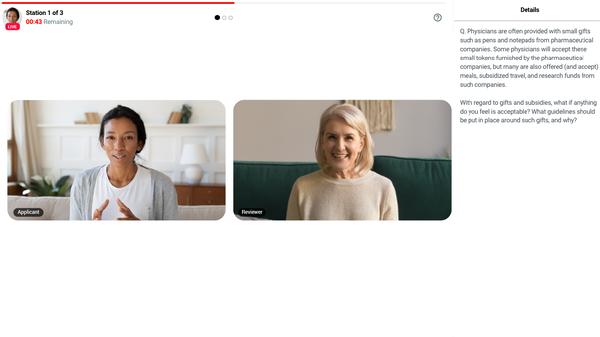
此外,有些问题还可能会询问你的品质、局限性、成就、偏好、道德原则、团队工作能力等。例题如下:
-
How do you work under pressure?
你是怎么在压力下进行工作的?
-
What is your greatest strength and weakness?
你最大的优势和劣势是什么?
-
If we asked a close friend or family member to describe you, what would they say?
如果我们请一位你亲密的朋友或家人来描述你,他们可能会怎么说?
-
What does “leadership” mean to you?
“领导力”对你来说意味着什么?
-
What professional skills do you excel in?
你在哪些专业技能方面表现出色?
-
What did you have for lunch/dinner?
你的午餐/晚餐吃了什么?
-
What is your best achievement?
你最大的成就是什么?
-
Describe a recent dream you had.
描述一下你最近做过的一个梦。
-
Do you agree that most people act out of altruism rather than self interest?
你是否同意大多数人的行为是出于利他主义而非自我利益?
-
Tell me about something funny that happened to you recently.
告诉我最近发生在你身上的有趣的事情。
-
Tell us about a time your had to collaborate with others. What qualities do you think are needed for strong teamwork to take place?
当你不得不与他人合作时,你认为强大的团队合作需要哪些品质?
-
How do you effectively prioritize when faced with multiple important tasks at once?
当同时面临多个重要任务时,你是如何有效地确定优先次序的?
-
What is your most significant accomplishment?
你最重要的成就是什么?
-
Tell us about a time when you had to defend an unpopular idea or opinion. How did you make your voice heard, and what was the outcome?
你是否不得不为一个不受欢迎的想法或意见进行辩护。你是如何让别人听到你的声音的,结果是什么?
-
What is your strategy when faced with a decision that must be made quickly?
当面临必须迅速做出的决定时,你的策略是什么?
-
Tell us something about yourself that isn’t in your application materials.
告诉我们一些你的申请材料中所没有的关于你的事情。
-
What three terms would you use to define yourself?
你会用哪三个词来定义自己?
-
Who is your role model?
谁是你的榜样?
-
Tell us about your greatest strength. How have you developed this strength and how has it helped you succeed?
告诉我们你最大的优势。你是如何发展这一优势的,它是如何帮助你成功的?
-
What factors contributed to your decision to apply for a seat in this program? tell us about your top three.
哪些因素促使你决定申请这个项目?告诉我们你认为最重要的三个因素。
-
Please tell me about an experience where you lead a team that consisted of a group of very different individuals. What did you do to lead the team to accomplish the objective, and what was the outcome?
你是否领导过一个由一群非常不同的人组成的团队。你做了什么来领导团队完成目标,结果是什么?
-
Outside of school and work, to what activity do you dedicate most of your time? Why is this important to you?
在学校和工作之外,你把大部分时间都用在什么活动上?为什么这对你很重要?
-
Which do you prioritize, social responsibility or profit? Why do you think one should be prioritized over the other (i.e., take a position and defend it)?
你会优先考虑社会责任还是利润?为什么你认为这一个应该优先于另一个(请表明立场并为其辩护)?
-
Tell us about a time when you had to come to a compromise with a colleague.
谈谈你不得不与同事达成妥协的时候。
-
How would you explain social media (e.g., Instagram, Facebook, Twitter, etc.) to someone 80 years old?
你会如何向80岁的人解释社交媒体(如Instagram、Facebook、Twitter等)?
-
What is the last book you read?/What is the most played song on your computer?/What is the last movie you saw?/Etc.
你最近读的书是什么?/你电脑上播放最多的歌曲是什么?/你最近看的电影是什么?
-
Tell me about a time when you went out of your way to help someone who wasn’t a friend or family member.
你是否有曾经不顾一切地帮助过一个不是朋友或家人的人。
5. Kira面试回答Tips
① 实话实说
即使被问及一些负面的问题,如个人局限性、弱点或失败的例子,你也需要诚实回答。如果他们问到某段经历,而这不是你做过的事情,你应该诚实说明,而不是试图编造一些东西或强加一个不相关的答案(例如,如果你真的没有为一个不受欢迎的观点辩护的经历,就诚实承认)。但是,在承认之后,还是要继续谈一谈——如果你面临这样的挑战,你会怎么做、你会如何思考这种情况、如何应对挑战、如何为自己的立场辩护,等等。
通常情况下,这类问题的 "How "与 "What"同样重要;比如,当你遇到的问题是——“谈谈你不得不与同事达成妥协的时候。(Tell us about a time when you had to come to a compromise with a colleague.)”,与其讨论妥协的细节,不如讨论你达成妥协的过程。“你达成妥协的过程”不仅可以向招生官展示你的沟通技能、个人素质,还可以展示你对“优先事项”的考虑。
② 学会将答案指向"为什么",即使院方没有直接问到这个问题
在诸如 "你最近读到的一本书是什么?"这样的问题中,很容易就可以说出一个书名,然后许多同学就不了了之了。这种策略其实不太好,最好的方式是在这类问题之后假设一个隐含的 "为什么?"。像 "谁是你的榜样?"等类似问题也最好采用这种答题策略。
努力在你的回答中突出你的价值、这种偏好背后的动机,以及你从参与这种想法中学到了什么或提高了什么素质。
以“你最近读到的一本书”这个问题为例:招生官实际上不一定对你读的东西感兴趣,而是对你是否阅读感兴趣,并想通过这个问题了解你是如何度过你的闲暇时间的、是什么样的想法吸引你阅读这本书、你是自愿读书的还是受其他人驱使的?
又比如“谁是你的榜样?(Who is your role model?)”这个问题,招生官其实更想知道的是你为什么敬仰他、他有什么品质吸引了你(因此,这大概也是你想在自己身上培养的品质)?
这就是问题背后隐藏的考核目的,所以,在诚实回答问题的基础上,提供回答背后的原因。
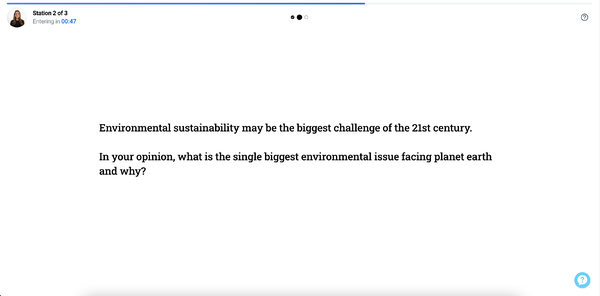
③ 展示你的关键素质和软技能
每个学科都有从业人员必须体现和坚持的标准、素质和理想,每个大学都有自己的使命、愿景和价值观,他们希望自己的学生能够体现出这些。
除了专业课程(例如,医学院、法学院等)有非常明确和具体的核心能力和关键的软技能展示给申请者外,你还可以通过查看学校的mission statement去了解学校的价值观和教育理念。找到这些,看看有哪些内容与你有共鸣,并根据这些内容回顾你自己的经历。
以英国帝国理工商学院为例,在IC 2020-2025的发展规划书中,可以看到他们对于研究生的期望是:
对所研究的学科有深刻的概念性理解;能够在文化多元的国际团队中高效工作,并具备跨学科工作的能力;具备足够的好奇心、批判性思维和创造力来应对挑战;能够应用创新性技能来解决复杂的现实问题;能够理解并重视不同的文化和观点等。
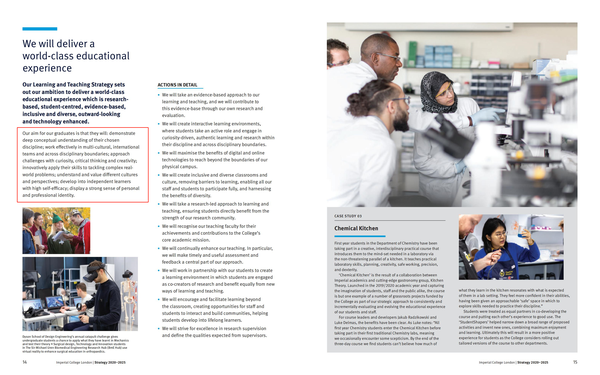
学会尝试基于这些期望,回顾一下你过往的经历,想想有哪些事例是可以证明你拥有这些品质的。
④ 关注你从过去的成功和失败中学到的东西
关于“失败、挑战和弱点”的问题在Kira面试中非常常见。没有人是完美无缺的,每个人都曾失败过,但失败是成功的一个重要组成部分;一个人要想成功,必定会在通往成功道路上的某个地方跌倒。所以,没有必要对你过往的“失败”遮遮掩掩,大方地向招生官分享你的经历,只要你能够证明你在失败中学到了什么,你是如何成长的,以及为什么你因为经历了这些而成为了一个更好的人。
在这类面试中,同样常见的是关于“成功、成就、和优势”的问题。和上述的方法相同,你要向招生官证明你从这些方面学到了什么。仅仅说明你与一个团队进行了有效的合作是远远不够的,你需要说明这种成功的合作是如何发生的,以及你从这些合作中吸取了哪些经验教训。
一般来说,这类问题是招生官用来观察你是否是一个善于自我反省的人,是否能从过往的经验中不断成长,是否有不断进取的积极性。如果你取得了一些成就,然后就开始沾沾自喜、停滞不前,没有善用这一成功来思考如何进一步推动自己,那么很显然,你并不具备招生官期待看见的“自我反省”能力。
满足于自己的成就本身没错,但你也必须承认,即使在人生最好的阶段,你也有成长的空间。这主要是用以向招生官展示你具备“终身学习、不断成长、自我完善”的特质,同时这些特质也是成熟专业人士的标志。
⑤ 将你所说的“特质”应用于你未来的职业
你不仅需要展示自身的特质,更需要展示这些特质对于你所想要申请的项目有哪些帮助。从过去吸取教训是值得赞赏的,但如果你不知道如何应用这些教训,或者不能看到它们与你未来想要从事的职业的关联性,那么它们于你而言就不是特别有效。
6. Kira面试样题详解
小鸥这里借用一个具体的案例给大家详细介绍一下上述方法要如何应用:
Kira情景假设:
面试者正在申请一个教育学学位,最终目标是有朝一日能成为一名教育工作者,在做Kira的面试时,面试者拿到的问题是——"你最大的劣势是什么?"
Kira面试模拟解析:
每个人都有缺点,而且可能不止一个。对于很多人来说,有一个缺陷是“无法拒绝他人的请求”,这导致我们承担很多能力范围之外的事。这里,小鸥就以这个point为例,作为面试者的弱点进行回答。
首先,你需要用一个具体的例子来解释这个弱点,说明是在什么时候最深刻地感受到这个局限性。
※ 示例(附译文,仅供参考):
“One thing I’ve really struggled with is saying 'no' to others. I often want to do everything I can to help the people in my life; however, I’ve started to realize that sometimes doing so much for others can leave me stretched too thin. For example, last summer, I was taking 2 college prep courses, working a near full-time job (35 hours per week), volunteering as a tutor for 10 hours per week, working on a community garden plot in my neighborhood, and playing volleyball with a close team that I’ve played with for several years. Looking back, it’s so clear to me now that this was way too much to try to take on, but at the time, I thought I’d be able to manage it. Unfortunately, it wasn’t long before my grades started to slip, I was running late to work or volleyball practice on a semi-regular basis, and some days, I was just too tired to put in my best effort in the garden or with my volleyball team. As well, I was personally not feeling very well, both physically and mentally, as the one thing that was consistently sacrificed was my own self-care.”"真正令我感到为难的一件事是对他人说'不'。我经常倾尽我所能帮助我周边的人;但我也开始意识到,有时为别人做太多事会让我有点‘力不从心’。例如,去年夏天,我参加了两门大学预科课程、做了一份近乎全职的工作(每周35小时)、每周做10小时的家教志愿者、在我家附近的社区花园工作、还和一个很要好的球队打排球。现在回过头来看,我才发现,一人承担这些事情实在是有点“负荷”了。但在当时,我觉得自己能够应付得过来。不幸的是,没过多久,我的成绩就开始下滑了,我上班或排球训练还经常迟到,有的时候,我真的很累,我也无法在社区花园工作、排球队里打球时尽自己最大的努力。此外,我的身体和精神状态也都出现了一些问题,因为有一件事一直被我牺牲掉了,那就是“照顾我自己”"。
接着,继续讨论我已经(或正在)努力改进的方法:
※ 示例(附译文,仅供参考):
“One day, a few of my co-workers approached me, concerned about my well-being and my performance at work; a few days later, two of my teammates said something similar. It was then that I really realized that, in not taking care of myself and my own needs – both personal and academic – I was also unable to put in 100% for my team, my co-workers, my students, or my fellow volunteers. I knew I needed to make some changes, so I met with my co-workers to see if I could shave off a few hours here and there each week, without causing them any undue stress. I spoke with my course instructors to explain the gaps in my performance, and they kindly allowed me to submit some extra credit work. As well, I started holding tutoring sessions at my house, rather than travelling to students’ houses, as this saved me a lot of time and effort from commuting. These small changes added up to a significant amount of relief. I was able to fulfill the rest of my commitments that summer, and I pulled my grades back up by getting high scores on the remaining work and completing the extra credit assignments. Needless to say, this was a huge wake-up call. I felt awful letting my team, students, teachers, and co-workers down, and I was so thankful for the interventions that led to me re-structuring my time. I hadn’t yet realized the impact that being over-worked could have on the people in my life – the very people I was working so hard to help. Now, I am very careful and strategic in how I manage my time, and I don’t commit to anything if I know that I won’t be able to give it 100% of my effort at all times.”"有一天,我的几个同事找到我,慰问了我的健康状况,还顺带聊了一下工作;而后几天,我的两个排球队队友也跟我说了类似的话。就在那时,我真正意识到,在没有照顾好自己和自己需求(包括个人和学术需求)的情况下,我也无法为我的团队、我的同事、我的学生或我的志愿者同伴投入100%的精力。我知道我急需做出一些改变,所以我与我的同事商量,看看我是否可以在不给他们造成额外压力的情况下,每周减少出勤几个小时。我还与我的课程导师交谈,解释了我成绩下滑的原因,导师很友好地允许我提交一些额外的学分作业进行弥补。此外,我开始在自己家里给学生进行家教辅导,而不是去学生家里,这为我节省了很多通勤的时间和精力。 这些小变化加起来,让我的状态得到了极大的改善。那年夏天,我得以履行其余的承诺,并通过在剩余的作业中获得高分和完成额外的学分作业将我的成绩拉了回来。毫无疑问,这件事警醒了我。我很抱歉让我的团队、学生、老师和同事失望了,我非常感谢那些使我意识到需要重新规划我的时间的“插曲”。(在此之前),我都没有意识到工作过度可能会对我生活中的人产生影响,而且这些人正是我努力工作想要帮助的人。现在,我在如何管理我的时间方面非常谨慎且也有了一定的策略,如果我知道我不能在任何时候付出100%的努力,我就不会承诺做任何事情。"
最后,以这个事件作为“触发点”,继续反思,为什么对我来说,特别对于一个有抱负的未来教育家而言,解决这个弱点是如此重要。
※ 示例(附译文,仅供参考):
“Burnout is incredibly, and increasingly, common for educational professionals. As a teacher, instructor, or professor, for example, you’re constantly pulled in many different directions at once, and it’s important to be able to balance doing everything you can for others, while also setting boundaries to protect yourself. Burnout is not only problematic for the person experiencing it, it also directly impacts everyone who relies on that person for support and collaboration. If I’m devoting too many of my resources to others and not replenishing myself, I won’t be able to continue like this and I will burn out. If I burn out, then I’m not helping anyone – myself, my family, my colleagues, my students, and so on. Setting boundaries and saying 'no' sometimes is necessary. I can’t help others if I’m not helping myself, and if I’m spreading myself too thin, then I’m not bringing 100% to the projects I do take on, which means the quality of my work overall could suffer, and I could let others down. On the other hand, if I simply set and maintain that boundary, it’s likely that someone else would be able to step into that role and fulfill it 100%. So, it is in my own best interest to work on this limitation, and it would be in my future students’ and colleagues’ best interests, too.”"对于教育专业者来说,职业倦怠是无法令人相信的,而且这种现象越来越普遍。例如,作为一名教师、讲师或教授,你会不断地被拉到许多不同的方向,但最重要的是要能够平衡为他人做的一切,同时也要设定界限来保护自己。倦怠不仅对经历它的人来说是个问题,它也会直接影响到依赖该人支持和合作的其他人。如果我把太多的资源投入到别人身上而不充实自己,我就无法继续工作,我会开始倦怠。一旦我倦怠了,那么我就没有办法帮助任何人--我自己、我的家人、我的同事、我的学生,等等。 设定界限,有时说 "不 "是必要的。如果我不帮助自己,就不能帮助别人,如果我把自己的精力分散得太厉害,那么我就不能百分之百地完成我所承担的项目,这意味着我的工作质量可能会受到影响,而且我可能会让别人失望。另一方面,如果我简单地设定并保持这一界限,那么很可能会有其他人能够介入这一角色并100%地完成它。所以,在这个限制上下功夫符合我自己的最佳利益,也符合我未来的学生和同事的最佳利益。"
可以看到,仅仅是这一个答案中就传达了多少种品质。面试者不仅承认了自己的局限性,还展示了自我意识和改进能力。在回答中,面试者讨论了一些自己正在努力尝试改善的地方,表现出了继续学习和努力的热忱。从表面上看是虽然是关于面试者自己的事情,但面试者也说明了ta对他人的影响,强调了ta对自己和他人的道德责任感,同时也使这项自我工作在本质上以学生为中心,也以自我为中心。
此外,面试者还注意到“能够与他人一起工作,并为他人工作”是ta提高自我的一个关键原因,这突出了ta十分注重同事关系并且拥有强烈的团队意识。面试者还承认,当ta的工作负担过重时,其他人可以承担一些工作,这表明面试者足够谦虚,知道其他人确实可以做ta所做的事情,而且做得很成功。这一点凸显了面试者谦虚的特质,也向招生官表明,“我不会自以为是,不会认为自己永远是工作的最佳和唯一人选”。
所有这些都是未来专业人员所追求的关键品质,面试者虽然没有直接从字面上表明“我是 learder",“我对自己和他人有道德责任感",“我有自我改进意识",但是,从他所说的故事,我们却可以更加深刻地了解到ta具备这些特质。
7. Kira面试的常见错误
不仅是Kira面试,任何像这样的远程虚拟面试中,面试者都必须考虑认真考虑如何展示自己和你的回答。与通过视频实时回答相比,打字回答可以让你更有效地控制你的想法和表达。
但是,这里有一些重要的 "注意事项 "需要牢记:
1. 不要在电脑上打出可能的回答,然后“照读”。这样会让你的回答听起来很假、很单调、很木讷。专业面试官和面试评委式绝对能看出你有没有在这样做。他们想看到的是真实的 "你",而如果你只是简单地“读出你的答案”,你就没有做到这一点。适当做些笔记用来唤醒记忆是可以的,但大串的句子和段落最好不要。
2. 也不要试图逐字逐句地背诵关于你自己的故事,这也会显得很不真实。为每个故事或你可能想利用的关键想法建立几个 "关键词",但不要把这些都写出来并背下来。这样做会让你没法根据现实情景修改你的措辞,如果你碰巧忘记了一个词或一个点,那将比你freestyle更难圆场。
3. 记得关闭电脑上的电子邮件提醒,并将手机调至静音状态。如果在你回答问题的过程中,通知的声音响了,很容易就会让你失去思路。在专业会议期间有这样的事情发生也会显得你很不尊重他人。
4. 诚实回答问题!通过回看学长学姐的面经的确可以提前准备一些问题,但仍然会有一些事情是需要你现场freestyle的,面试前的准备很难面面俱到(你可以准备,但你永远不知道你实际上会拿到什么问题)。
5. 不要简单地列出活动或特质,而不说明它们于你而言为什么重要。要知道,你所申请的大学会有你的文书材料,其中会包括你的工作经历、课外活动等活动的完整清单,所以在面试中把这些一个一个念出来其实是在浪费时间。你需要思考你所经历的最有意义的经历,并好好准备怎么详细介绍他们,重点谈谈你学到了什么、你是如何成长的、你通过这些经历培养了什么品质或能力、以及为什么你会因为拥有这些经历而成为一个更好的人。
同样,不要简单地只说你有某些品质;而是要用例子具体说明。例如,不要只说你是一个好的leader,尝试用一个例子,说明你曾经担任过leader,并讨论你在这个经历中学到的经验。
6. 不要为了抬高自己而贬低别人。过分自信或夸夸其谈并不是一个好的做法,说别人的坏话以使自己看起来像一个更强大的候选人永远不是一个有效的策略。谈论你的成就和为你的成功感到高兴本身没错,但你仍然需要证明你是谦虚的,且有兴趣为所有人的进步贡献自己的一份力量,而不是只关注你如何能脱颖而出。
7. 如果你因为紧张,说话有点磕磕绊绊,结结巴巴,或在说话时犯了错误,请不要担心,招生官会理解的。每个人都会犯错,花一秒钟时间恢复心情并回到正轨,不要让这一点错误让你过于紧张。能够从这样的小错误中恢复过来,而不是让它像乌云一样笼罩在你其余的回答中,其实也是展示你的应变能力的一种方式。
最后,祝大家面试成功,顺利拿到offerヾ(≧∇≦*)ゝ
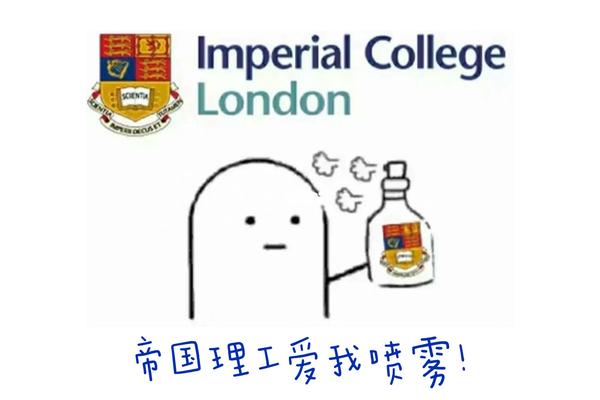
*InVisor是一个走品质路线的去中介化留学品牌,提供高质量的背景提升(包括科研辅导、实习辅导)和留学申请服务。如果喜欢本文,欢迎点赞支持。



